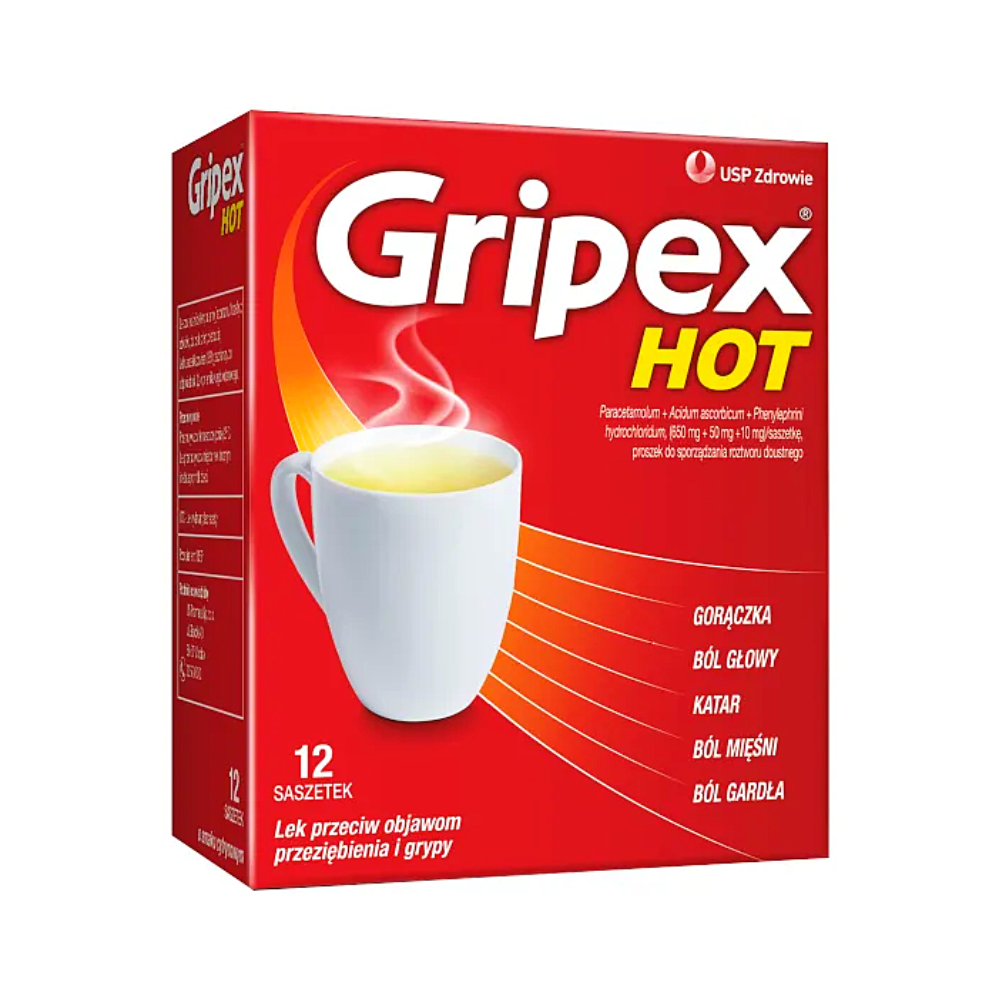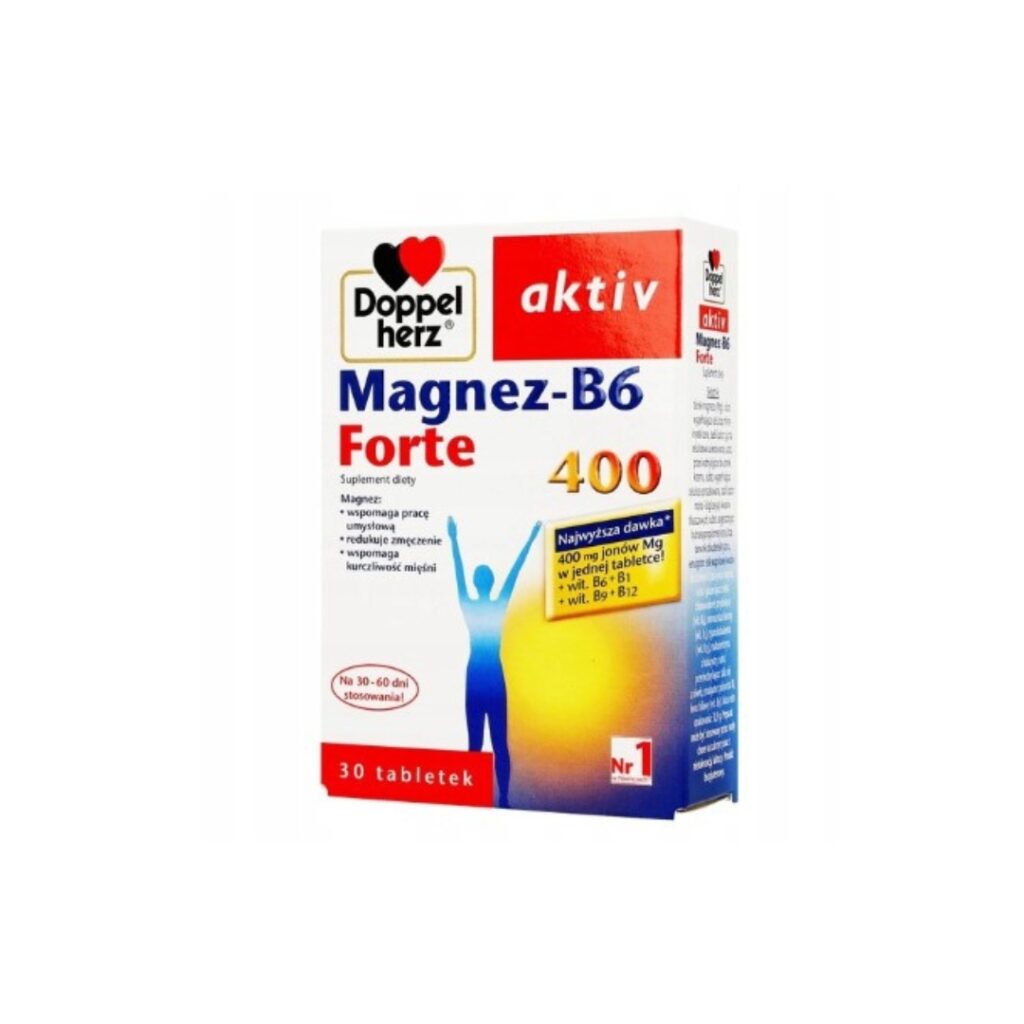Gripex Hot is a multi-ingredient drug with antipyretic, analgesic, and clearing effects. It soothes the symptoms of colds, flu and flu-like illnesses.
Gripex Hot can be used to relieve the symptoms of colds, flu and flu-like infections such as fever, headaches, sore throats, muscle and osteoarticular pains, and symptoms of rhinitis occurring in colds and flu.
If you do not feel better or feel worse after 3 to 5 days, please contact your doctor.
Effects
Relieving symptoms of:
- colds,
- influenza and flu-like infections,
- fever,
- headaches
- sore throats,
- muscle and osteoarticular pains,
- rhinitis
Active substances: Acidum ascorbicum, Paracetamolum, Phenylephrini hydrochloridum
Composition
| 1 sachet contains: | Paracetamolum (paracetamol) 650 mg |
| Ascorbic acid (kwas askorobowy) 50 mg | |
| Phenylephrini hydrochloridum (phenylephrine hydrochloride) 10 mg and excipients, including sucrose and aspartame (E951). | |
| The excipients are: aspartame (E 951), sucrose, citric acid, sodium citrate, lemon flavors, potassium acesulfame (E 950), quinoline yellow (E 104). |
Dosage
The drug should not be used in children under 12 years of age.
Adults and adolescents over 12 years of age:
1 sachet, if necessary, repeat the dose not more often than every 4-6 hours (maximum 6 sachets a day). The contents of the sachet should be dissolved in a glass of hot water. Do not use for more than 3-5 days without medical advice.
Use of the drug in children and adolescents
The drug should not be used in children under 12 years of age.
Contraindications
When not to use Gripex Hot
- If you are allergic to the active substances or sympathomimetic amines or to any of the other ingredients of this medicine.
- If you have the following conditions:
- unstable coronary artery disease,
- Heart arythmia,
- high blood pressure
- congenital deficiency of glucose-6-phosphate dehydrogenase and methemoglobin reductase,
- severe liver or kidney failure,
- viral hepatitis,
- alcoholism,
- fenyloketonuria,
- narrow-angle glaucoma,
- anatomically narrow drainage angle.
- During the use of MAO inhibitors and for up to 2 weeks after discontinuation of these drugs.
- While taking zidovudine (a medicine used to treat HIV infection).
- In children under 12 years of age.
Contents
The drug is a powder for oral solution, packed in sachets.
Storage method
Below 25°C
Manufacturer
US PHARMACIA
Warnings
Talk to your doctor or pharmacist before using Gripex Hot.
Contact your doctor if:
-
- you have: liver or kidney failure, bronchial asthma, enlarged prostate gland, overactive thyroid gland, Raynaud’s syndrome (paleness and then blueness of the fingers, toes, edges of the earlobes and the tip of the nose, often when exposed to cold or emotion), coronary heart disease, hypertension, diabetes;
- the patient is taking anticoagulants.
- Due to the risk of overdose, check that other medicines you use do not contain paracetamol.
- Do not use other anti-influenza, cold and decongestant drugs at the same time.
- The use of the product by people with liver failure, alcohol abuse and starvation poses a risk of liver damage.
Pregnancy and breastfeeding
If you are pregnant or breast-feeding, think you may be pregnant or are planning to have a baby, ask your doctor or pharmacist for advice before taking this medicine. Do not use during pregnancy and breastfeeding.
Interactions with other drugs
Tell your doctor or pharmacist if you are taking or have recently taken or might take any other medicines.
The drug should not be used simultaneously with other drugs containing:
- paracetamol (an active ingredient in many cold and flu remedies);
- phenylephrine or pseudoephedrine (used to treat symptoms of rhinitis, or runny nose);
- other sympathomimetics or MAO inhibitors (used to treat low blood pressure or depression);
- zidovudine (an antiviral medicine used to treat HIV infection).
Consult your doctor before using it concomitantly with:
- anticoagulants (warfarin, coumarin);
- antiepileptic drugs;
- barbiturates (sedatives and sedatives);
- other drugs that induce liver microsomal enzymes (e.g. isoniazid, rifampicin anti-tuberculosis drugs);
- metoclopramide (an antiemetic);
- cholinolytics (used in bronchial asthma, in the treatment of gastric ulcers and reflux, as antiemetics, in spasms of the gastrointestinal tract, in the symptomatic treatment of Parkinson’s disease);
- blood pressure lowering medicines (guanethidine, mecamylamine, methyldopa, reserpine);
- indomethacin (an analgesic and anti-inflammatory drug, used, among others, in rheumatoid arthritis);
- β-adrenergic antagonists (medicines used in high blood pressure and cardiovascular diseases);
- tricyclic antidepressants.
The ascorbic acid contained in the drug increases the absorption of:
- aluminum (found in antacids);
- iron.
Side effects
The following side effects may occur:
- skin and subcutaneous tissue disorders: allergic reactions (pruritus, urticaria), disorders of the immune system: hypersensitivity reactions up to symptoms of anaphylactic shock,
- gastrointestinal disorders: nausea, vomiting, digestive disorders, epigastric burning, dry mouth, circulatory system disorders: increased blood pressure, tachycardia, arrhythmias, pallor of the skin,
- respiratory system, thoracic and mediastinal disorders: breathing disorders, bronchial asthma attack,
- kidney and urinary disorders: urination disorders, renal colic, renal papillary necrosis,
- nervous system disorders: anxiety, insomnia,
- mental disorders : hallucinations, anxiety, nervousness,
- blood and lymphatic system disorders: granulocytopenia, agranulocytosis, thrombocytopenia.




